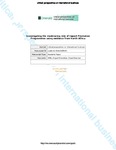Investigating the moderating role of Export Promotion Programmes using evidence from North-Africa
| dc.contributor.author | Haddoud, Mohamed Yacine | |
| dc.contributor.author | Onjewu, A | |
| dc.contributor.author | Jones, P | |
| dc.contributor.author | Newbery, R | |
| dc.date.accessioned | 2017-11-21T16:10:59Z | |
| dc.date.available | 2017-11-21T16:10:59Z | |
| dc.date.issued | 2018-01-05 | |
| dc.identifier.issn | 1742-2043 | |
| dc.identifier.uri | http://hdl.handle.net/10026.1/10244 | |
| dc.description.abstract |
<jats:sec><jats:title content-type="abstract-subheading">Purpose</jats:title><jats:p>Based on an institutional approach to explaining firms’ internationalisation, this paper aims to empirically investigate the role of Export Promotion Programmes (EPPs) in moderating the influence of export barriers perceptions on small and medium enterprises’ (SMEs) propensity to export.</jats:p></jats:sec><jats:sec><jats:title content-type="abstract-subheading">Design/methodology/approach</jats:title><jats:p>The study uses evidence from Algeria, the largest North-African country. The data were collected using an online questionnaire, targeting SMEs operating in the manufacturing sector. The study considers the influence of procedural, informational, environmental and functional barriers on export propensity, to uncover the moderating role of trade missions, trade shows and export seminars and workshops on such relationships. To examine these links, five main hypotheses are proposed and tested through a non-linear partial least squares structural equation modelling on a sample of 128 Algerian SMEs.</jats:p></jats:sec><jats:sec><jats:title content-type="abstract-subheading">Findings</jats:title><jats:p>The results show that while internal barriers decrease firms’ export propensity, EPPs including trade fairs and shows may independently pose either a positive or negative influence on such relationships.</jats:p></jats:sec><jats:sec><jats:title content-type="abstract-subheading">Research limitations/implications</jats:title><jats:p>The study confirms the applicability of the institutional perspective to explaining firms’ internationalisation. More importantly, the present study highlights the role of EPPs in moderating the influence of export barriers perceptions on SMEs’ international market entry, a role neglected by the extant empirical literature.</jats:p></jats:sec><jats:sec><jats:title content-type="abstract-subheading">Practical implications</jats:title><jats:p>The current findings hold important implications to export promotion organisations operating in African countries. Notably, the results reveal that some programmes could have a negative influence if they are not delivered appropriately.</jats:p></jats:sec><jats:sec><jats:title content-type="abstract-subheading">Originality/value</jats:title><jats:p>This study offers a rare focus on the moderating role of EPPs in the relationship between export barriers and export propensity, within the setting of a North-African country.</jats:p></jats:sec> | |
| dc.format.extent | 282-308 | |
| dc.language | en | |
| dc.language.iso | en | |
| dc.publisher | Emerald | |
| dc.title | Investigating the moderating role of Export Promotion Programmes using evidence from North-Africa | |
| dc.type | journal-article | |
| dc.type | Journal Article | |
| plymouth.issue | 2/3 | |
| plymouth.volume | 14 | |
| plymouth.publication-status | Published | |
| plymouth.journal | critical perspectives on international business | |
| dc.identifier.doi | 10.1108/cpoib-11-2016-0059 | |
| plymouth.organisational-group | /Plymouth | |
| plymouth.organisational-group | /Plymouth/Faculty of Arts, Humanities and Business | |
| plymouth.organisational-group | /Plymouth/REF 2021 Researchers by UoA | |
| plymouth.organisational-group | /Plymouth/REF 2021 Researchers by UoA/UoA17 Business and Management Studies | |
| dcterms.dateAccepted | 2017-11-17 | |
| dc.rights.embargoperiod | Not known | |
| rioxxterms.versionofrecord | 10.1108/cpoib-11-2016-0059 | |
| rioxxterms.licenseref.uri | http://www.rioxx.net/licenses/all-rights-reserved | |
| rioxxterms.licenseref.startdate | 2018-01-05 | |
| rioxxterms.type | Journal Article/Review |


